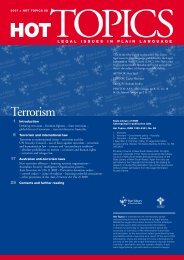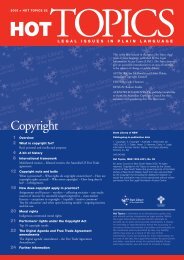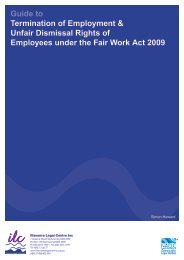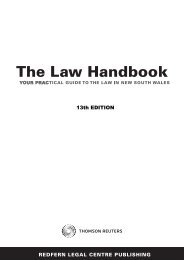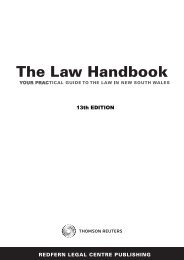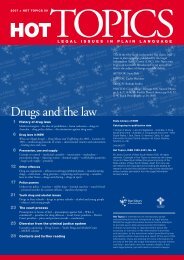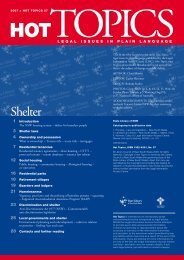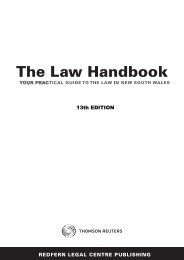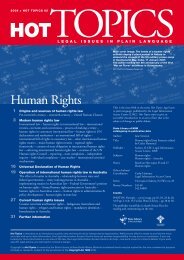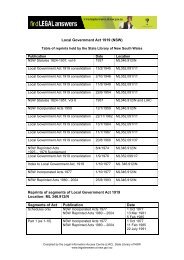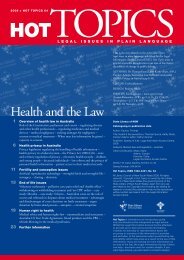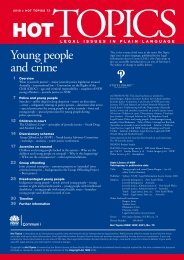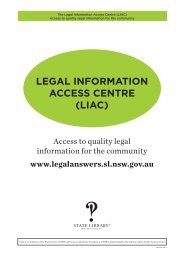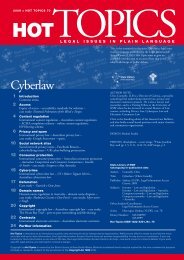Prisoners - Legal Information Access Centre - NSW Government
Prisoners - Legal Information Access Centre - NSW Government
Prisoners - Legal Information Access Centre - NSW Government
Create successful ePaper yourself
Turn your PDF publications into a flip-book with our unique Google optimized e-Paper software.
Act, a ‘duty’) of citizenship, a basic human right, and a<br />
mechanism of participation in a democratic polity. The<br />
independent country-based MP, Peter Andren, and the<br />
leader of the Greens, Senator Bob Brown raised these<br />
broader arguments.<br />
Peter Andren:<br />
‘the right to vote – to have a say in who governs<br />
the country and even, at a state level, who runs<br />
the prisons – is a basic human right. as a right,<br />
it is not something that should be taken away by<br />
politicians.’ 85<br />
Bob Brown:<br />
‘the whole basis of the respect for the rule of<br />
law rests on the participation of citizens through<br />
the democratic selection of their representatives<br />
making the law. how will prisoners subject to<br />
this feudal concept of civil death have respect for<br />
the law if they are banned from participating in<br />
its formation? one has to remember that it is our<br />
job to encourage people to take part in society,<br />
to feel empowered to be in society and to feel<br />
they have a role in society – not to take away that<br />
role.’ 86<br />
The government argument seemed to be that<br />
disenfranchisement of prisoners enhances civic<br />
responsibility and the rule of law. That same argument<br />
had been put by the UK, South African and Canadian<br />
governments previously and rejected by the courts each<br />
time. 87 In the case of Sauvé the Canadian Supreme<br />
Court stated:<br />
the legitimacy of the law and the obligation to<br />
obey the law flow directly from the right of every<br />
citizen to vote. to deny prisoners the right to vote<br />
is to lose an important means of teaching them<br />
democratic values and social responsibility. 88<br />
When challenged in the Australian High Court in the<br />
Roach case (see separate box) it was unsuccessful as<br />
well and the 2006 legislation totally disenfranchising<br />
prisoners from voting in federal elections was struck<br />
down as unconstitutional. The court upheld the 2004<br />
legislation which restricted the vote to those serving<br />
sentences of less than three years.<br />
cAse sTudy – r v BenBriKA<br />
in r v Benbrika and ors (Ruling no 20) [2008] Vsc 80<br />
(20 March 2008), Justice Bongiorno upheld a defence<br />
submission for a stay of proceedings on the basis that<br />
the conditions of imprisonment in the acacia unit at<br />
Barwon were such that a fair trial was not possible.<br />
the defence argument was that the oppressive<br />
conditions in which they are currently incarcerated and<br />
transported is having such an effect on their capacity to<br />
attend to their own interests in defence of the charges<br />
against them that the trial they are currently engaged in<br />
is unfair and will become more so as time passes.<br />
r v Benbrika [2008] Vsc 80, para 80.<br />
Justice Bongiorno ruled that:<br />
the minimum alterations to the accuseds’ conditions<br />
of incarceration and travel which would be necessary<br />
to remove the unfairness currently affecting this trial<br />
are as follows:<br />
1. they be incarcerated for the rest of the trial at the<br />
Metropolitan assessment prison, spencer street.<br />
2. they be transported to and from court directly<br />
from and to the Map without any detour.<br />
3. they be not shackled or subjected to any other<br />
restraining devices other than ordinary handcuffs<br />
not connected to a waist belt.<br />
4. they not be strip searched in any situation where<br />
they have been under constant supervision and<br />
have only been in secure areas.<br />
5. that their out of cell hours on days when they do<br />
not attend court be not less than ten.<br />
that they otherwise be subjected to conditions of<br />
incarceration not more onerous than those normally<br />
imposed on ordinary remand prisoners, including<br />
conditions as to professional and personal visitors.<br />
(see para 100)<br />
an adjournment was granted to enable these changes to<br />
be made, following an earlier ruling that screens in the<br />
court had to be removed.<br />
on 15 september 2008 Benbrika was found guilty<br />
of intentionally directing the activities of a terrorist<br />
organisation and of being a member of a terrorist<br />
organisation. Five of Benbrika’s followers were found<br />
guilty of intentionally being members of a terrorist<br />
group and four others were acquitted. in February 2009,<br />
Benbrika was sentenced to 15 years in prison.<br />
Available online at http://www.austlii.edu.au/au/cases/vic/VSC/ 2008/80.<br />
html<br />
85. Hansard, House of Representatives, 10 August 2004.<br />
86. Hansard, Senate, 12 August 2004.<br />
87. In the UK case of Hirst v United Kingdom (No 2) 74025/01 ECHR 2004; the South African case of Minister of Home Affairs v National<br />
Institute for Crime Prevention (NICRO) (2004) 5 BCLR 445 (CC) and the Canadian case of Sauvé v Canada (Chief Electoral Officer) [2002]<br />
3 SCR 519.<br />
88. [2002] 3 SCR 519, pp 4-5.<br />
20<br />
HOT TOPICS 67 > <strong>Prisoners</strong>



